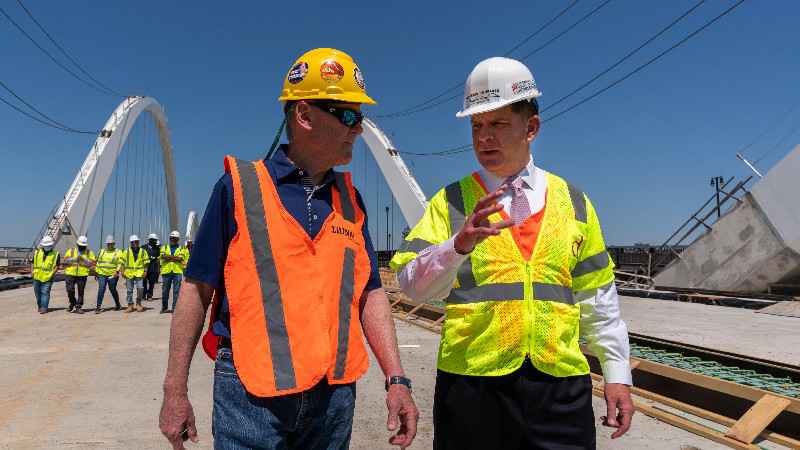GOP not budging on infrastructure offer in Biden talks

Secretary of Labor Marty Walsh, right, visits the Frederick Douglass Memorial Bridge construction site together with District of Columbia Mayor Muriel Bowser and Secretary of Transportation Pete Buttigieg, in southeast Washington, Wednesday, May 19, 2021.[AP Photo/Manuel Balce Ceneta]
Senate Republicans have not substantially budged off their initial $568 billion infrastructure proposal despite overtures from the White House to work toward a compromise as President Joe Biden tries to strike a bipartisan agreement on his sweeping $2.3 trillion infrastructure plan.
The lack of any sizable movement beyond the Republicans’ initial proposal or any other notable changes to narrow the gap with Biden is certain to spark fresh worries from Democrats that time is slipping for a deal. There was “not a significantly changed offer” from the Republicans during their meeting with the administration this week, according to a person granted anonymity to discuss the private negotiations.
At the White House, Press Secretary Jen Psaki said “productive conversations” are underway on Capitol Hill.
The White House team is expected to resume talks with the senators on Friday. “We’re looking forward to constructive conversations tomorrow,” Psaki said.
The administration and the GOP senators have been in talks ever since Biden met with a core group of Republican negotiators last week over the possibility of working together on a plan. The White House dispatched the Transportation and Commerce secretaries and top aides to Capitol Hill to meet with the Republicans late Tuesday after the president asked the senators to provide more more details on their initial offer.
The lead Republican negotiator Sen. Shelley Moore Capito of West Virginia was encouraged by the talks and expected the White House to be back in touch by week’s end, her office said.
Securing a vast infrastructure plan is Biden’s top priority as he seeks to make good on his campaign pledge to “build back better” in the aftermath of the coronavirus crisis and the economic churn from a shifting economy. But with narrow Democratic majorities in the House and Senate, the president is reaching out to Republicans for support on a potentially bipartisan approach rather than relying simply on his own party to muscle the proposal to passage.
Republicans and the White House are tangled over the definitions of infrastructure as Biden seeks new investments in hospitals, child care centers and electric vehicles for this first bill, and Republicans remain more narrowly focused on traditional roads, bridges and other “hard” infrastructure projects.
The Republican offer is a more tailored package, focused on roads, bridges and broadband spending, and without the broader investments the president argues should be part of any modern infrastructure deal.
Senate Republican leader Mitch McConnell has said they could go as high as $800 billion on a package.
But House and Senate Democrats say much of what Republicans proposed so far is simply existing spending and nowhere near that amount.
Still, some Democrats balk at the size and scope of Biden’s proposal, and the party may lack the votes to pass it through Congress on their own. Biden is trying to forge a bipartisan compromise with Republicans.
Meanwhile, the House and Senate transportation committees are plunging ahead on separate surface transportation bills that could become building blocks in a broader package.
The Democratic chairman of the House Transportation & Infrastructure Committee, Rep. Peter DeFazio of Oregon, acknowledged that his Memorial Day target for consideration of the bill will slip, but said Wednesday he intends to bring it forward in June.
The Senate panel is also aiming to have its bill considered by Memorial Day.
At the same time, House Republicans are preparing their own alternative to Biden’s plan.